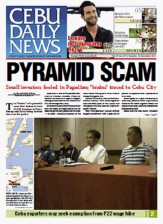Small investors fooled in Pagadian; ‘brains’ traced to Cebu City

Cebu City is one of the possible locations of Manuel Amalilio whose addressed was traced to 99 Espina Village B. Rodriguez Extension by the National Bureau of Investigation (NBI).
Interior and Local Government Secretary Mar Roxas last night said he was coordinating with local police and the NBI- 7 to locate Amalilio, chairman of the Pasay-based trading firm Aman Futures Group Philippines Inc.
He said the victims, most of them low-income earners, came from Pagadian City and other parts of the Visayas and Mindanao who were lured by a ‘get-rich-quick” scheme.
They were promised a return of their original investment with a profit of 15 percent to 40 percent after a period of 20 to 30 days.
Roxas spoke in a press conference in Cebu City, joined by Chief Supt Marcelo Garbo of the Police Regional Office and Liberal Party Cebu province coordinator Hilario Davide III.
Article continues after this advertisementRoxas said the NBI traced Amalilio’s address to 99 Espina Village B. Rodriguez Extension in Cebu City. The residence has been placed under survillance.
Article continues after this advertisementOther persons involved in the scam were identified as Cebuana Lilian Lim Ghan, Fernando Luna of Pagadian City, Edward Lim, Hazel Lopez and William Fuentes.
Secretary Roxas said there were many complainants, but at this stage the case has not “matured” to the point of filing a case.
He said Amalilio could already be in Malaysia by now based on some reports.
Roxas said he is coordinating with Justice Secretary Leila De Lima for a hold departure order to be issued against Amalilio and others involved in the scam.
A joint task force with the PNP will be formed to catch Amalilio, who was described as a Filipino of Malyasian descent.
After receiving the information on Thursday, Roxas flew to Pagadian City to see the victims.
A total of P244 million was involved in the money scam, he said.
Amalilio’s group would solicit investments or money placements, promising to return the entire sum through post-dated checks with a profit of 15 to 30 percent to as high as 40 percent.
The SEC said “it appears that what lures investors in parting with their money is the promise and corresponding expectation of high returns or profits.”
Last month, the Securities and Exchange Commission (SEC) issued a cease-and-desist order against Aman Futures to stop offering unregistered securities, soliciting investments or pooling funds.
“Unless restrained,” the company would “operate as a fraud on investors or is otherwise likely to cause grade or irreparable injury or prejudice to the investing public.” said the SEC’s Oct. 8 order.
After the CDO isuance, the next step would be to “find basis for a criminal complaint” with the help of witnesses.
Aman Futures and its agents were barred from transacting any businesses involving funds in its depository bank. The company was also prevented from transferring, disposing or conveying any of its assets.
The SEC order was based on a report by its enforcement and prosecution department (EPD), which acted on complaints about the money scheme.
“People are allegedly lining up every day in order to invest their hard-earned money in the hope of receiving the promised return,” said the EPD report.
After a September 6 conference with Aman Futures, the SEC documents noted that the company’s corporate secretary Isagani Laluna and Lurix Lopez, one of the directors, described Amalilio as a long-time commodity futures trader in Malaysia and Japan.
They said Aman Futures accepted investments or money placements trhough checks or bank transfers. At the end of a 20- to 30-day period, the company would put into the investor’s account the principal plus the profit ranging from 15 to 40 percent.
Aman Futures officials said the firm had a customer agreement with Malaysian brokerage firm Okachi (Malaysia) Sdn. Bhd. that in turn engages in futures trading of commodities such as oil, manganese, palm oil and nickel.
The SEC cited the company for four “grave” violations of the Securities Regulation Code.